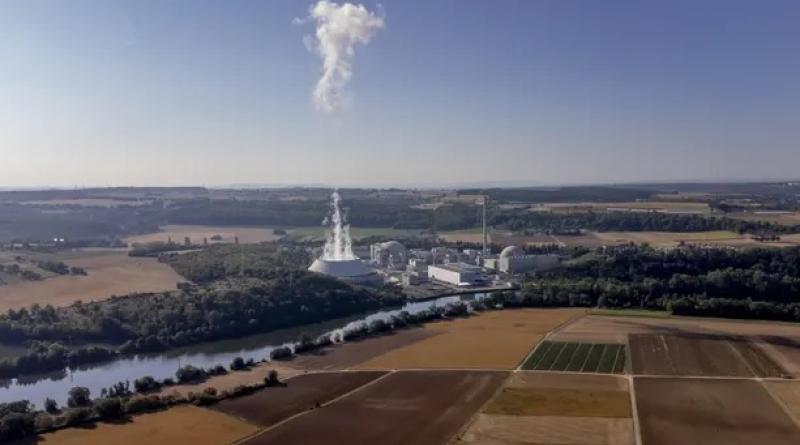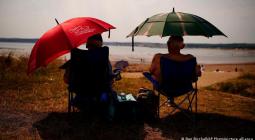German chancellor rejects calls to reverse nuclear power plant closures

Olaf Scholz says country has enough energy to get through winter after Russia cut gas supplies
The German chancellor, Olaf Scholz, has rejected calls for his government to commit to a longer-term extension of the life of the country’s nuclear power plants and insisted that Europe’s largest economy would have enough energy to get through the winter.
Scholz shut down criticism from the opposition conservative alliance and at least one leading economist, who have described his coalition’s decision to keep two remaining reactors in emergency reserve rather than letting them produce electricity, as “madness” while the government refuses to reverse its long-term plan to close down the last remaining plants.
Criticism about the nuclear roadmap is also coming from within Scholz’s government. His coalition partner, the pro-business FDP, has urged Scholz to overturn the 2011 ban on nuclear power introduced by Angela Merkel as a reaction to the Fukushima disaster.
In a heated parliamentary debate on Wednesday morning, Scholz defended his government’s strategy to tackle the energy crisis. Facing fierce criticism from the opposition, he said his government was confronting problems created by the previous administration under Merkel – in which he served.
The crisis, triggered by Russia’s invasion of Ukraine, has been exacerbated in recent weeks by Moscow’s reduction of gas supplies to Germany, which was followed a week ago by a complete halt. Moscow has cited maintenance issues linked to sanctions imposed by the west.
Scholz accused Friedrich Merz’s conservative alliance (CDU/CSU) of refusing to accept responsibility for its role in the crisis, calling it “the party which holds complete responsibility for the fact that Germany made decisions to withdraw both from coal and from atomic energy, but never had the strength to enter into anything else”. He also accused the conservatives of failing to embrace renewable energy and actively campaigning against it.
“You were incapable of bringing about the expansion of renewable energies. You led defensive battles against every single wind turbine,” he said. By trying now to save as much gas, electricity and oil as it can before winter kicks in – in part with the construction of LNG terminals and expanding renewable energy – Scholz said his government was “solving problems that the union failed to recognise as such when it was in power”.
Scholz said Germans would “rise above themselves” and deal with the coming winter with “with boldness and bravery” and said that Germany was close to its goal of becoming independent from Russian gas exports. Gas storage facilities were 86% full on Wednesday.
Merz accused Scholz’s economy minister, Robert Habeck, of “pandering to environmental lobbyists” and squandering the chance to find solutions to the energy crisis by seeking what he called a “lazy compromise” by refusing to allow Germany’s three remaining nuclear power stations to continue operation for the next two to three years.
On Monday Habeck had announced that two of them would remain “on standby” supported by the necessary staff, equipment and security, but would not be producing electricity unless needed. Merz said the decision was irresponsible, arguing that continuing running the plants would help secure energy supplies and that the increased electricity production would help control the market price.
“The ignorance shown to this topic is written all over your face,” he said to Habeck, calling the last existing nuclear power plants “the most modern and safe reactors in the world”.
In Wednesday’s Bundestag debate, Alice Weidel, co-leader of the far-right AfD, accused the government of leading Germany to financial ruin with its policies, including a €65bn (£56bn) package announced on Sunday, aimed to ease household finances.
“You have every reason to fear a heated autumn and winter,” she said, in reference to figures on the right and left who have called for protests against high living costs. She said people had “every right” to take to the streets.
Amira Mohamed Ali, parliamentary leader of the far-left Die Linke, accused the coalition government of having “no social conscience”. She urged the government to approach Russia in an attempt to bring it to the negotiating table and end its hostilities in Ukraine.
The instability of nuclear power is one of the main reason for not relying on it, the economics ministry argued when it presented its plans on Monday. Currently only 28 of 56 plants in France are on the grid, due in part to the shortage of cooling water linked to this summer’s drought, meaning Germany has had to supply its neighbour with electricity.
cover photo: he nuclear power plant at Neckarwestheim. Scholz’s government has refused to reverse its long-term plan to close down the last remaining atomic generators by the end of this year. Photograph: Michael Probst/AP



